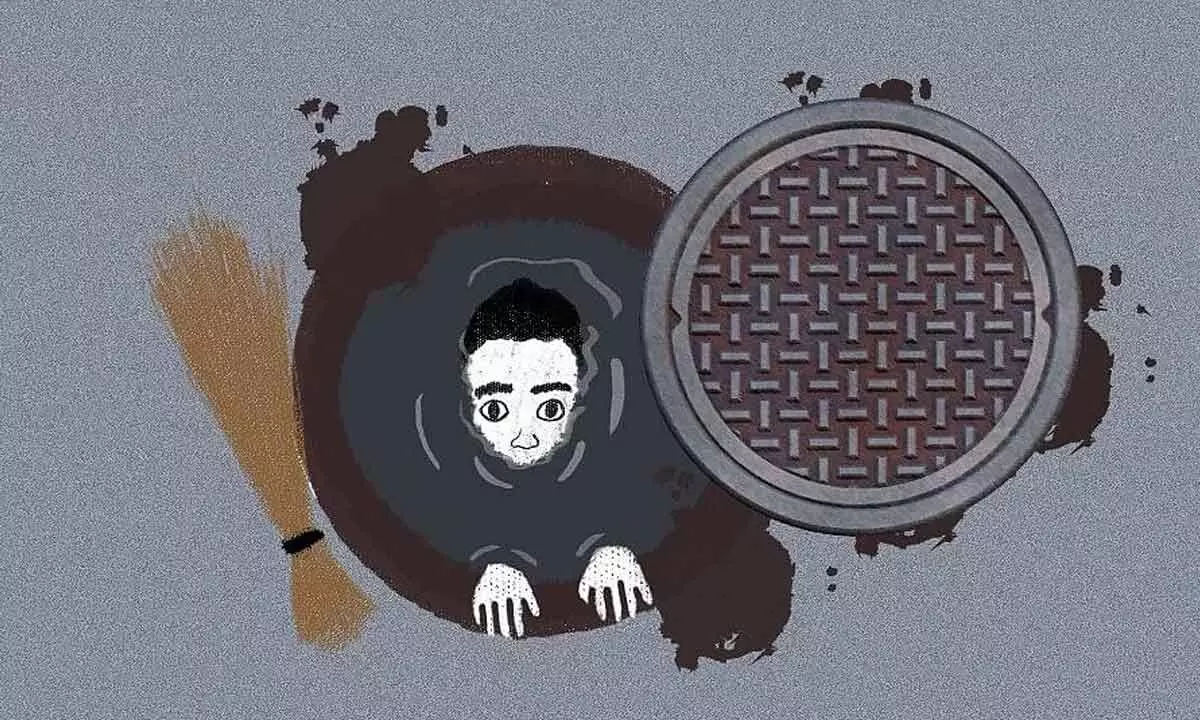Live
- Google Pixel 8a Price Leak: What to Expect in India?
- Vijayawada: Enumeration of fishermen for livelihood assistance from tomorrow
- Google Removes Fake Investment Apps FHT and SS-Equitrade from Play Store
- YSRCP MLA candidate T N Deepika participates in Nai Brahmins poster unveiling event in Hindupuram
- Janasena and TDP Leaders Organize 'Mana Kosam Mana Nayakkar' Program in Narsapuram Constituency
- Forest dept ratchets up efforts to capture eluding leopard at RGIA
- Modi lashes out at Congress for committing sins against Constitution
- Cong failed to implement promises: Vinod Kumar
- Rajamahendravaram: MP Margani dares TDP for debate on city development
- Inheriting an art from a trailblazer mom
Just In
India’s shame: Human dignity goes down the drain


There seems to be no end to India’s continuous shame of manual scavenging i.e., manually cleaning, carrying, disposing of human excreta, in sewers,...
There seems to be no end to India’s continuous shame of manual scavenging i.e., manually cleaning, carrying, disposing of human excreta, in sewers, open drains or pits into which flows dirty mass from latrines, or on railway track or in septic tank at such spaces or premises. It’s a shame that governments continue to dither on rooting out this profession engaged in by the lowest rungs of society, identified by their caste.
A week ago, seriously concerned over the unending pain of sewer workers, the Supreme Court ordered the Centre and the States to do everything to completely eradicate manual scavenging. It asked them to pay Rs 30 lakh as compensation to the next of kin of those who die while cleaning sewers. It also said that those who suffer permanent disabilities should be paid Rs 20 lakh as minimum compensation, and for other injuries a compensation up to Rs 10 lakh can be paid to the victims.
The apex court issued as many as 14 directions to the Union and the States for effective implementation of the Prohibition of Employment as Manual Scavengers and their Rehabilitation Act, 2013. Justice S Ravindra Bhat, who along with Justice Aravind Kumar pronounced the verdict, rightly noted that, it is not without reason that our Constitution has placed great emphasis on the value of dignity and fraternity. But for these two, all other liberties are chimera. All of us today, who proudly bask in the achievements of our republic, have to awake and arise so that the darkness which has been the fate of generations of our people is dispelled.”
As many as 347 people died while cleaning sewers and septic tanks in India in the last five years, the Lok Sabha was informed last year. Then a question pops up in anyone’s mind why this inhuman practice is allowed to persist. Manual scavenging was outlawed in India in 1993, and another law in 2013 reinforced this ban and recognised cleaning of sewers and septic tanks as manual scavenging. Even so, it is argued that the text of the law stresses on better facilities such as protective gears for the workers rather than removing the practice altogether – thus leading to normalisation of the practice itself.
A few years ago, an inter-ministerial task force counted up to 53,236 people involved in manual scavenging in India. Even the Swachh Bharat Abhiyan intended to turn India ‘open-defecation free’ is ironically leading to perpetuation of manual scavenging as the two-pit system which dispenses with the practice is not provided for a majority of 10 crore public toilets built under the programme. The governments are majorly complicit in this social crime.
The root of the problem lies in the ostrich-like attitude of the society which is tolerating the negligence of governments in stopping the degrading and de-humanising practice and rehabilitating the sewer workers. Funds are provided for, but not released. Governments’ lofty aims are a sham, indeed. Change in perception is much needed in the society as well as the governments, until then India will reek of the smells of this nauseating and inhuman profession. Mechanised sewer cleaning is the need of the hour wherever needed. Until then we will continue to see pathetic lives bogged down in human excreta. It is a battle for freedom from unbearable stench, gross indignity, ill-health and low wages for thousands in the country.

© 2024 Hyderabad Media House Limited/The Hans India. All rights reserved. Powered by hocalwire.com






